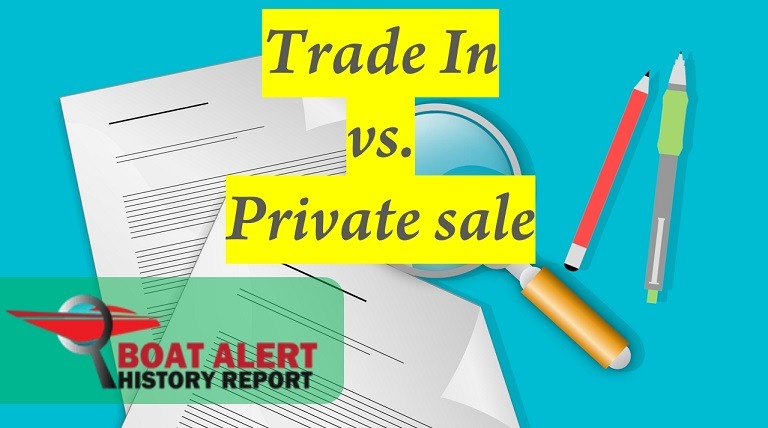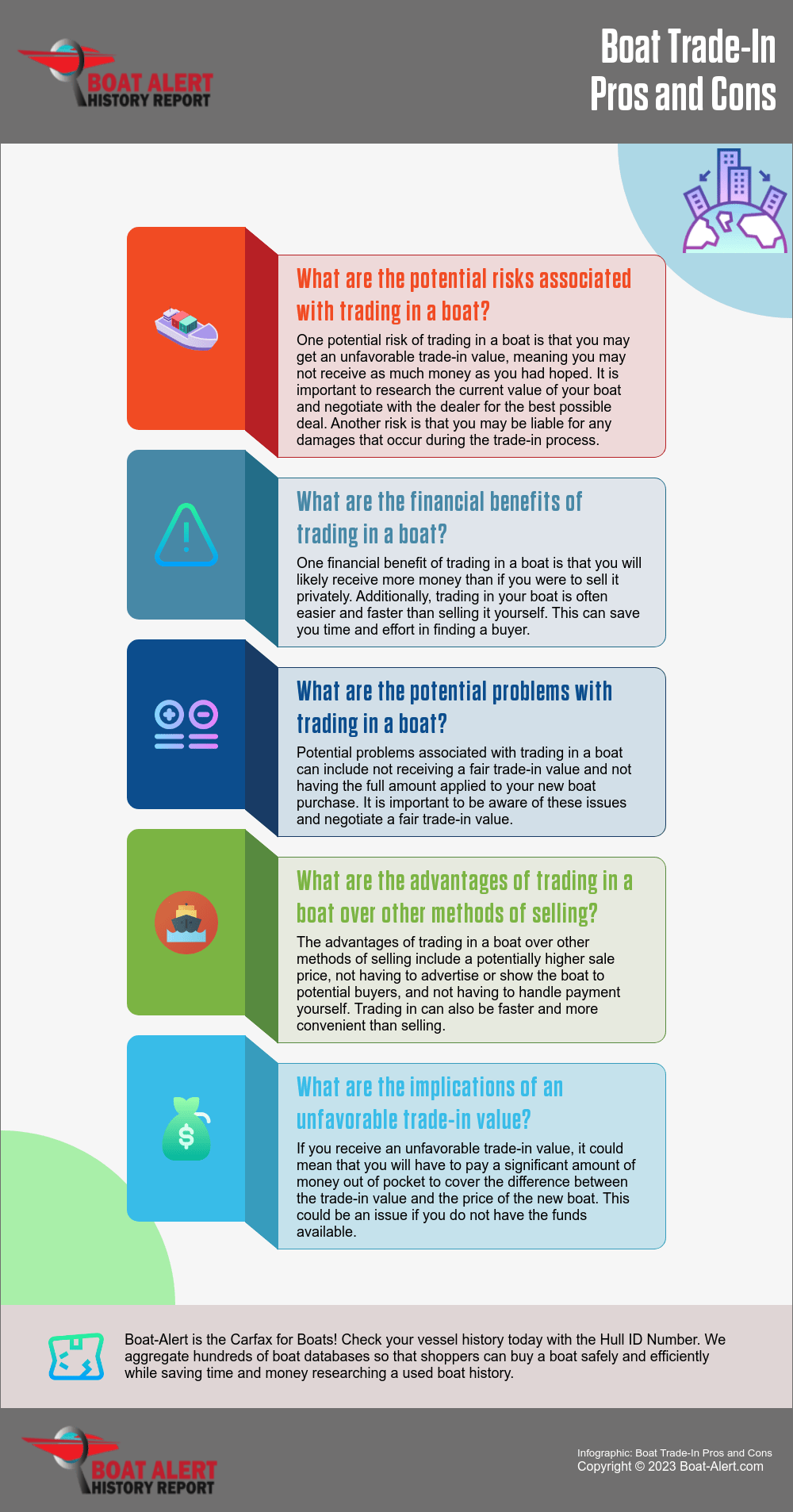Selling Your Boat: DIY Vs. Trade In

If you’ve decided to sell your boat, you may wonder how to proceed. Depending on your situation, you can either sell the boat yourself or trade it in for a new one.
This article discusses whether you should trade in a boat or sell it privately. Each option has its unique procedure and benefits, and we are here to expertly guide you regarding both. A third option is to sell it on consignment.
Table of Contents
Selling your Boat: What are your Options?
When the time comes to sell your boat, you have several different options. You could hire a dealer or a broker to sell the boat for you, privately list the boat online on platforms such as BoatTrader, Craigslist, and eBay, or trade-in your boat for a new one. If you don’t want a new-new boat, you can probably eliminate the trade in option since most dealers don’t accept trades on second-hand boats unless they are very special. However, with a little research, you may find a dealer ready to take your boat as a trade-in.
DIY (sell boat privately on Classifieds)
Selling privately or “DIY selling” means putting a classified ad in a newspaper or online covering many local boating areas. You then wait for a potential buyer to contact you and make all the arrangements accordingly.
Smaller boats can be sold in local markets and are perfect for private sales. However, larger boats/yachts, custom boats with limited production, and blue water cruisers may be better off sold through a broker since the market is more diverse.
But if your transaction doesn’t involve financing or banks, and you can target the right market easily, it is best to go with DIY selling. Consider how much free time you have to dedicate to negotiating with potential buyers, some of whom may not be serious.
Boat Trade-in
Trade-ins are perhaps the easiest method of buying a new boat. All you have to do is simply pass the registration documents and keys to a dealer, who takes care of everything from paperwork to the boat’s delivery. The drawback of this method is that the convenience doesn’t come cheap, as you will be giving up a substantial amount of the boat’s trade-in value in exchange for a no-effort process.
During a trade-in, you bring your boat to a dealer who will then examine the boat’s value and apply that to your new boat’s cost. Based on your state, there may also be some tax benefits to trading in your boat, and the dealer can help you with that.
If you are wondering, “For how much should I trade in my boat?” you should look up book values with NADA and check listings for similar boats.
Selling your Boat Online
Nowadays, selling your boat is only a few clicks away. With so many online boating sites, you can easily pick a site and start the process by yourself. Online boating marketplaces can vary regionally, so be sure to consider local websites and exchanges along with national platforms.
Here are some of the popular online marketplaces for selling your boat. You may also consider reading our blogs on how to sell on each platform in detail. Be prepared for the questions they might ask.
Selling your vessel with a Broker
If selling your boat privately sounds like a hassle, you could hire a broker to do the work for you. They are usually part of a yacht brokers association.
A boat broker is an expert who brings buyers and sellers together and helps negotiate transactions on behalf of others. A broker will list your boat, advertise it and try to sell it more quickly than you may be able to do on your own.
Since these specialists have strong connections, knowledge, and extensive experience within the industry, they can market your boat to the right people and handle the paperwork efficiently. Listed below are some of the other advantages of selling your boat through a broker:
- They list boats for sale on major platforms like YatchWorld and listing sites with maximum visibility.
- They can help advertise the boat effectively with photography and by highlighting its unique specs that sell.
- They can recommend competitive pricing.
- They can handle buyer inquiries and prepare the boat for sea trials and inspection.
- They can feature boats for sale at boat shows and other events with high traffic.
- They can help with boat loans or financing
Scrap it
If your boat isn’t in good condition or no reasonable buyer is interested in buying it, you may have a hard time selling or trading it in. In such rare circumstances, your best option may be to scrap or recycle the boat.
Should you Trade-in or DIY?
If you’re still undecided between selling your boat by yourself and trading it in, you may want to consider the benefits and drawbacks of each option.
Benefits of DIY
- A higher sale value. If you decide to sell the boat yourself, you can price the boat however you like and usually fetch a much higher sale price.
- More versatile options. You will also have a ton of flexible options when it comes to listing your boat. You can pick one or more platforms, including online platforms and print media (newspapers and magazines). You can also choose whether you want to work with a dealer or broker or try to sell the boat privately. The limitations are far fewer.
- Full control and transparency. If you like to be in control of what’s going on, then selling the boat privately is the way to go. Not only that, but you will also have complete transparency throughout the process. You can talk to the buyer directly, negotiate the sale price, and choose who gets ownership of your vessel next.
- Liquidity. If you are unsure about your next boat purchase or simply want to have more flexible buying power with the sale proceeds, it is best to sell the boat directly and get the liquid cash.
Drawbacks of selling the vessel yourself
- As a private seller, you will be responsible for incurring costs to list and advertise the boat.
- In general, boats for sale by private sellers are limited to their own boat ad/listing and therefore need to market their boats independently.
- Selling the boat privately can be time–consuming since you will have to deal with all the potential buyers, arrange sea trials and process the paperwork.
- You will also be responsible for negotiating the sale price and accommodating any survey problems independently.
- Private sellers are also more susceptible to falling for boat-buying scams since they don’t have much knowledge of the market.
Now on the flip side, there are pros and cons for trading in your yacht or boat:
Benefits of Trade-in for a boat
- Easy and hassle-free. Trading in a boat will save you a lot of steps that are generally involved in selling a boat privately. For example, you won’t have to list the boat or worry about bargaining with different bidders.
- Quicker resolution. Selling a boat privately or through a broker could take several weeks or months, whereas trading in could sometimes allow you to finalize the deal within a single day.
- A brand new boat. Trading in your old boat allows you to buy a new boat, which is perfect if you are a boat enthusiast. Of course, this isn’t the only way to purchase a new boat, but it’s certainly quick.
- Tax benefits. The money you receive by selling your boat privately may be subject to capital gains tax, but if you are trading in the boat and applying the value to a new investment, you can avoid paying these taxes completely.
Drawbacks of Trade-in
- Trading in a boat is useful to exchange your old boat for a new one. If you want to receive liquid cash in exchange for selling the boat, you may be better off doing it privately since many dealers do not accept trade-ins.
- You may not receive a good sale price compared to selling the boat privately since the dealer takes a good chunk of money from the proceeds.
Consider boat consignment instead of trade-in
To avoid problems related to trade-in, you can consider selling your boat on consignment. A consignment is when you hand over the boat to an organization or individual (a consignee) to sell it. During the sale process, however, you can retain the boat’s legal ownership until the deal has been finalized.
Avoid boat consignment scams by knowing how it is used in fraud.
Which option is best for you?
The option that is best for you will depend on a range of factors. For example, your current knowhow of the boat market, how much free time you have, whether you want to buy a new boat in exchange for the current one or just want to receive liquid cash, whether you want a high sale price or not, and if you want professional guidance.
Here’s the information presented in a table format:
Trading in a Boat:
| Pros | Cons |
|---|---|
| Convenience: Transaction handled at one location | Lower value compared to selling privately |
| Time-saving: Avoid listing, inquiries, and negotiations | Limited options based on dealership inventory |
| Simplicity: Straightforward process | Negotiation challenges for trade-in value |
| Tax advantages (in some regions) |
Selling Privately:
| Pros | Cons |
|---|---|
| Higher value compared to trade-in | Time-consuming: Advertising, inquiries, negotiations |
| More control over the process | Inconvenience: Scheduling showings, test drives |
| Larger market reach for potential buyers | Safety concerns when meeting strangers |
Please note that the tables are not exhaustive and there may be additional factors to consider in your specific situation & trade-offs.
If you are experienced in selling a boat, want full control of the selling process, don’t mind putting in the hard work, and want a high sale price, then you should consider selling it privately.
On the other hand, if you seek convenience and professional guidance, and wouldn’t mind compromising on the sale value, then a trade-in may be a better option.
Conclusion
This article talked about selling a boat privately VS. trading it in. We further discussed the benefits and drawbacks of each option so you can better decide which is more suited to your needs and situation.
#DIYBoatSelling #BoatTrade-in #DIYvsTrade-in #tradein #boat #sellboat #dealership #privateseller

Read Related Articles:
- Boat Manufacturers in Florida
- Common Legal Issues When Selling a Used Boat: How to Avoid Them
- Maine Boat Registration
- Quote-Ready Leads for Marine Surveyors
- Top Websites for Boat Rentals (Reviewed)
Categories: To learn more about Boat-Alert.com History Reports for used boats and boat search visit: www.Boat-Alert.com